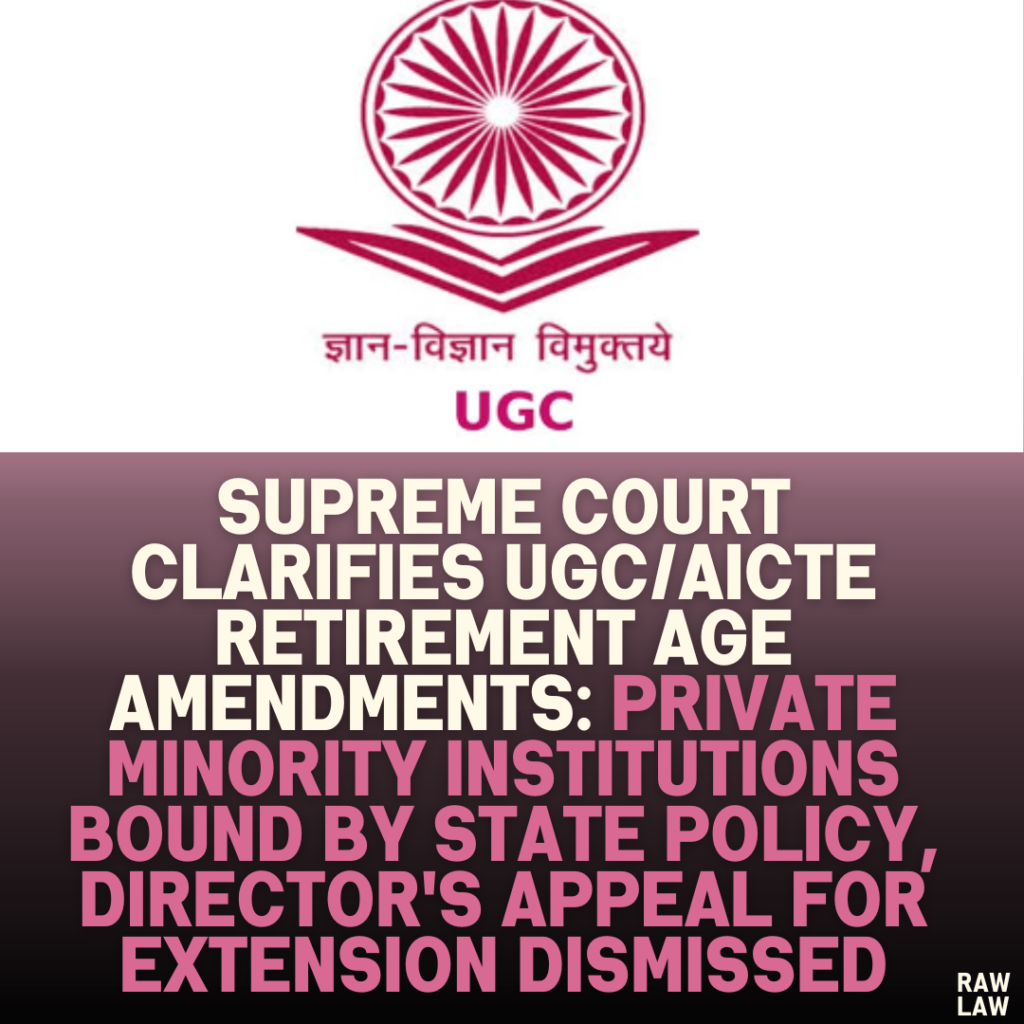Court’s Decision
The Supreme Court dismissed the appeal and upheld the decisions of the High Court (Single Judge and Division Bench), concluding that the appellant’s retirement at the age of 60 was lawful. The court held that the amended UGC and AICTE regulations enhancing the retirement age to 65 do not automatically apply to institutions in the State of Telangana unless adopted by the state government. As CSIIT is a private unaided minority institution affiliated with JNT University, the retirement age is determined by the state regulations, which remain at 60.
The court clarified that the appellant, who served as a non-teaching director, was not eligible for the increased retirement age benefits, which apply only to teaching staff.
Facts
- The appellant was initially appointed as a lecturer in 1985 at JNT University and later promoted to Reader in 1995.
- In 1998, he was selected as Director of CSIIT, a private unaided minority institution affiliated with JNT University. The appointment letter referenced the prevailing retirement age, which was 60 years at that time.
- In 2010, UGC and AICTE regulations were amended to increase the retirement age for technical institution teachers to 65 years. However, these amendments were not adopted by the State of Telangana or JNT University.
- The appellant was relieved of his duties on 14.08.2018, and another individual was appointed in his place.
- The appellant sought continuation in service until 65 years based on the amended regulations. He made representations, but they were rejected by CSIIT. The Single Judge and Division Bench of the High Court dismissed his petitions challenging his retirement.
Issues
- Applicability of Revised UGC and AICTE Regulations:
Whether the amended UGC and AICTE regulations, which increased the retirement age to 65, are binding on CSIIT and its director. - Classification of Appellant’s Role:
Whether the appellant, a non-teaching administrative director, qualifies as a “teacher” under UGC and AICTE regulations to claim the benefit of the enhanced retirement age.
Petitioner’s Arguments
- Binding Nature of UGC/AICTE Regulations:
The appellant argued that the institution is governed by UGC and AICTE norms and that these norms are binding, not merely recommendatory. - Extended Retirement Age:
He claimed entitlement to the enhanced retirement age of 65 under the amended 2010 UGC/AICTE regulations. - Precedent:
To support his claim, he relied on various judgments, including:- Islamic Academy of Education v. State of Karnataka: Regulations issued by UGC are binding.
- Sreejith P.S. v. Rajasree M.S.: Extended retirement age applicable under specific circumstances.
- Kalyani Mathivanan v. K.V. Jeyaraj: Binding effect of UGC regulations.
Respondent’s Arguments
- Autonomy of Minority Institution:
CSIIT is a private unaided minority institution affiliated with JNT University but administered independently by the Church of South India. It is not bound to implement amended regulations unless adopted by the State of Telangana. - Non-Adoption by State:
The State of Telangana issued G.O.Ms.No.40 (2012), stating that it would not adopt the revised retirement age of 65. As such, the affiliated institutions, including CSIIT, continue to follow the retirement age of 60. - Role of the Appellant:
The appellant did not discharge teaching duties and was appointed as a director with administrative responsibilities. AICTE regulations distinguish between “teachers” and “administrative staff,” and the benefits of extended retirement age apply only to teachers. - Acceptance of Retirement:
The appellant had sought retiral benefits, including leave encashment and gratuity, indicating acceptance of his retirement at the age of 60.
Analysis of the Law
- Applicability of Regulations:
The court noted that UGC and AICTE regulations require adoption by state governments to be enforceable within their jurisdiction. In this case, the State of Telangana and JNT University had not adopted the amendments. - Distinction Between Teaching and Administrative Roles:
The court highlighted that AICTE regulations pertain only to individuals engaged in classroom teaching or directly related academic activities. The appellant’s role as a director was purely administrative, and he did not qualify for the extended retirement age. - Binding Nature of State Policies:
The court reaffirmed that state governments have the autonomy to decide whether to adopt amendments to UGC and AICTE regulations. Institutions affiliated with state universities must align with state policies.
Precedent Analysis
The court examined the judgments cited by the appellant but found them distinguishable:
- In each case, the applicability of UGC regulations was based on specific facts and the roles of individuals.
- In this case, the appellant’s role as a non-teaching administrative director and the non-adoption of amendments by the state rendered these precedents inapplicable.
Court’s Reasoning
- Autonomy of the State:
The court emphasized that the State of Telangana’s decision not to adopt the amended regulations is binding on all affiliated institutions. - Role of the Appellant:
The appellant’s administrative responsibilities as a director did not make him eligible for benefits meant for teaching staff. - No Evidence of Teaching Duties:
The appellant failed to provide evidence to prove he qualified as a teacher.
Conclusion
The Supreme Court upheld the High Court’s decision, dismissing the appellant’s claims. It ruled that:
- The retirement age for the appellant remains 60 years as per state regulations.
- The amended UGC and AICTE regulations are inapplicable since they were not adopted by the state or the institution.
Implications
- Affirmation of State Autonomy:
The judgment reinforces the principle that state governments and universities have discretion in adopting UGC/AICTE amendments. - Clarification on Administrative Roles:
The decision draws a clear distinction between teaching and administrative roles, limiting the scope of extended retirement age to the former. - Precedent for Future Disputes:
This ruling will guide similar disputes regarding the binding nature of UGC and AICTE regulations on private institutions.




Pingback: Delhi High Court Quashes Charges of Rape, Deceit, and Coercion: Holds Prolonged Consensual Relationships Cannot Retroactively Constitute Offenses Without Clear Evidence of Misrepresentation - Raw Law